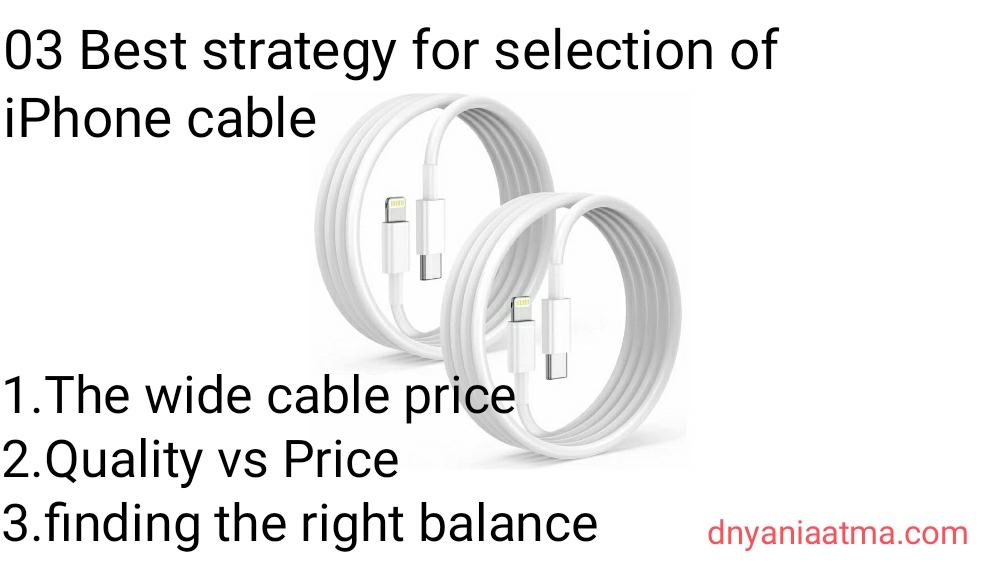
The Basics of iPhone Cables
Before we dive into the iphone cable price, let’s start with the basics. iPhone cables, also known as Lightning cables, serve a dual purpose: charging your device and transferring data. They feature a proprietary Lightning connector on one end, which plugs into your iPhone, and typically a USB-A or USB-C connector on the other end, which connects to a power source or computer.
Table of Contents
The Wide iphone cable Price Range
If you’ve shopped for iPhone cables, you’ve probably noticed a wide range of prices. At one end of the spectrum, you can find budget-friendly cables for a few dollars, while at the other, premium options can cost upwards of $30 or more. So, what drives these price disparities?
- Build Quality: One of the most significant factors influencing the price of an iPhone cable is its build quality. Cheaper cables often use subpar materials that are more prone to wear and tear. Premium cables, on the other hand, are constructed using high-quality components and are designed to withstand daily use.
- Certifications: Apple has a MFi (Made for iPhone/iPad) certification program, which ensures that accessories meet their quality and safety standards. MFi-certified cables tend to be more expensive due to the rigorous testing they undergo.
- Length: Longer cables generally cost more than shorter ones. The extra material and potential signal loss over longer distances contribute to the higher price.
- Brand: Established brands like Apple, Belkin, and Anker often charge a premium for their cables due to their reputation for quality and reliability. Lesser-known brands may offer more affordable alternatives.
Quality vs. Price: Is it Worth Investing in Expensive Cables?
Now, let’s address the age-old question,Are expensive iPhone cables worth the investment? The answer isn’t one-size-fits-all and depends on your needs and priorities.
- Reliability: High-quality cables are less likely to fray or break, saving you money in the long run. Cheap cables may seem like a bargain initially but can end up costing more if they need frequent replacement.
- Safety: MFi-certified cables are designed with safety in mind, reducing the risk of electrical issues or damage to your device. Safety should always be a top concern when choosing a cable.
- Performance: Premium cables often offer faster charging and data transfer speeds. If you value efficiency and convenience, investing in a better cable may be worthwhile.
- Compatibility: Cheaper, non-certified cables may not work well with all iOS updates or devices. MFi-certified options are more likely to remain compatible with future Apple products and software updates.
- Peace of Mind: Knowing you have a reliable cable can provide peace of mind, especially when your device is low on battery and you need a quick charge.
Finding the Right Balance
Balancing cost and quality is key when choosing an iPhone cable. Consider your budget, usage patterns, and the importance of factors like durability and speed. Here are some tips to help you find the right balance:
- Identify Your Needs: Are you looking for a cable primarily for charging, data transfer, or both? Knowing your requirements will help you choose the right type of cable.
- Read Reviews: Before purchasing, read reviews and user experiences to gauge the reliability and performance of the cable you’re considering.
- Check for Certifications: If safety is a top priority, opt for MFi-certified cables. These are tested to meet Apple’s standards.
- Consider Warranty: Some premium cable brands offer warranties that can provide added value.
- Look for Deals: Keep an eye out for promotions, discounts, or bundles that can make high-quality cables more affordable.
Conclusion
In the world of iPhone cables, prices can vary significantly, reflecting differences in build quality, certifications, and brand reputation. While it may be tempting to go for the cheapest option, investing in a reliable, high-quality cable can save you money and frustration in the long run. Consider your specific needs and priorities when making your choice, and remember that staying connected with your iPhone is worth the cost of a dependable cable.
FAQ’S
Why do iPhone cables have varying prices?
The reputation of the brand, the length of the cable, its longevity, its capacity for rapid charging, and whether or not it is MFi certified (Made for iPhone/iPad) all affect price.
Are more expensive iPhone cables better in quality?
Not invariably. Reasonably cost MFi certified cables can deliver dependable performance, even though some pricier cables offer superior features. Take into account your unique requirements and brand image.
Do cheaper iPhone cables compromise on quality?
Certain generic or non-certified cables could have lower quality standards, which could result in shorter lifespans or compatibility problems. Selecting MFi certified cables is recommended for dependable performance.
What is the average price range for MFi certified iPhone cables?
The price range for MFi approved cables usually varies from $10 to $30, contingent upon the brand, length, and other features like reinforced construction or quick charging.
Can I find affordable MFi certified cables that meet Apple’s standards?
Yes, a lot of reliable manufacturers sell reasonably priced MFi certified connections that meet Apple’s requirements for performance and quality.

Pingback: 9 Best Iphone Charging cables(2023) - dnyaniaatma.com
Pingback: (11+ ideas )How to Transfer Data from Android to iPhone - dnyaniaatma.com
Pingback: Best Tactical Smartwatch 2023's Game Changer - dnyaniaatma.com